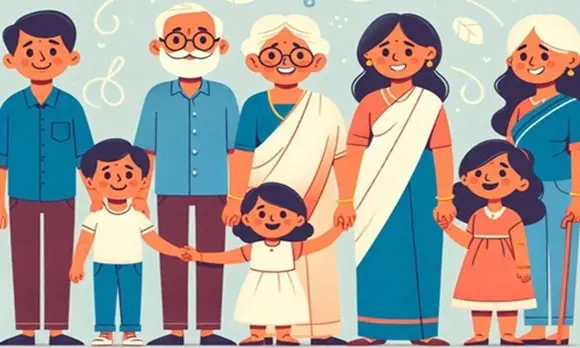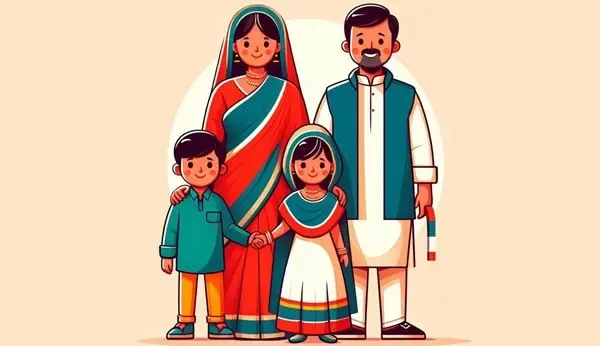Before you get to know the advantages and disadvantages of a joint family, you must understand the concept of it all:
What Exactly Is A Joint Family?
By definition though, a typical joint family consists of members of two or more generations living together under one roof. Here, parents, children, grandparents, aunts, uncles, nieces, nephews, and cousins all share resources and responsibilities inherent in the joint family system. Simply put, a joint family is where you see the true meaning of the word “Family.” Such a type of family structure is usually found in South Asian countries like India and Pakistan. It might be a bit strange in many parts of the world to live as a joint family, but there sure are some benefits to it. And we are here to talk about both the advantages as well as the disadvantages of joint family. So, let’s get to just that, shall we?

Advantages of Joint Family
1. Built-in Emotional Support System
See, in a joint family, you’re never really alone, you have someone to rely on at every turn of your life, who would give you solutions to all your problems and listen to you with an open mind. Sometimes loneliness and depression might affect you but this joint family setup makes sure you don’t have to be alone, ever. You feel safe and protected, you feel loved, cared for, and ultimately content because if the going gets tough, you have an entire team to bail you out.
2. Sharing the Load
In a joint family, tasks like housekeeping are more a matter of every individual playing their part and contributing to the larger effort, you know? No one person has to do all the work, and everybody learns the importance of getting along with each other and dividing up the jobs.
3. Financial Safety Net
Of the many advantages of having a joint family, the greatest attraction is undeniably the financial advantage, you know, the burden of expenses is borne by all. While the joint family members work to contribute more towards their earnings, the household expenses become comparatively low. Most importantly, there arises an added benefit, like if one faces a tough time like, say, job loss or medical expenses, the other family members are there to support each other.
4. Raising and Educating Kids
It is in these joint families that kids get the best of everything, the warmth, and guidance of elders, along with life skills and lessons that go far beyond what a school textbook teaches. These elders have the time and inclination to tell their stories and experiences, and the kids benefit by having a much better idea of what life is all about, right?
5. Keeping Traditions Alive
You know, beyond cultural traditions, joint families also serve a strong purpose in preserving values. Taking it as a duty, elders pass on customs, rituals, and etiquette to youngsters. And yes, it is very true that this sense of identity and continuity might be challenging to maintain in nuclear families due to busy schedules and less interaction with elders.
6. Unconditional Love and Strong Bonds
Joint family living leads to a loving atmosphere and sharing emotions. Due to this, we feel bonding with everyone because we are talking to each other, eating together, and experiencing everything together. In a joint family system, you get the feeling of love and care. They are trying to give you full support and care, particularly when you are sick or in some trouble. That’s what unconditional love is all about, you know, when there are no terms attached to helping you out. And that’s what a true family member can do.
Disadvantages of Joint Family
1. No Room for Privacy
The worst thing about living in a joint family is the serious issue of privacy. It is so difficult to find time for yourself, away from everyone. Personal moments will always be few and far between. Things that are supposed to be private quickly turn into everyone else’s business.
2. Interference in Personal Decisions
You see, it is true that decisions in a joint family are very often taken by involving the elders. You need to get approval from the elders if you want to change your career, or would like to bring up your kids in a different way, or even want to wear a certain dress or World Cup jersey, you know?
3. Parenting Challenges
There are challenges in bringing up children in a joint family, too, like the old timers might have cliched, old-fashioned ideas of what’s right and wrong which could be completely at odds with what is normative in the 21st century. That’s something you should think about.
4. Money Matters and Clashes
You see, handling finances in a joint family can lead to frequent disagreements. How? To begin with, the head of the family may use his success and that he is the breadwinner of the family when he decides how to manage the money and maybe some of the family members refuse his rule because they do not think he manages the money right. All in all, arguments over spending priorities and contributions to household expenses are common, causing tension and dissatisfaction among family members.
5. The Good Old Generation Gap
When different generations live together under the same roof, conflicting views are very likely to arise on lifestyle, values, and habits, among others. It is pretty common that younger members might feel that their thoughts and opinions are not respected. Overall, the generation gap can create a rather frustrating living environment, especially when there is little or no effort to middle ground between different parties.
6. Family Drama and Favoritism
See, when family members feel valued in the group, life can be satisfying. But when only some members of the family receive special treatment, others might resent any inequality and form negative feelings against it. It is particularly hard for children to thrive in such an environment.
Quick Comparison Between Advantages and Disadvantages of a Joint Family
|
Advantages |
Disadvantages |
| Constant emotional support | Lack of privacy |
| Shared household responsibilities | Interference in personal decisions |
| Financial security and shared expenses | Challenges in modern parenting |
| Enhanced child-rearing with elder guidance | Frequent financial disputes |
| Preservation of traditions and values | Generational conflicts |
| Strong family bonds and unconditional love | Issues with favoritism and family drama |


